In a world…
Where our government has abandoned us…
Where incompetence, fear, and greed are the laws of the land…
Only one group of rogue heroes…
Can save us from annihilation.
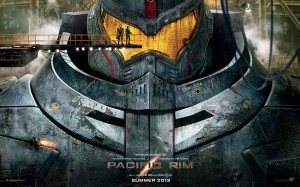
No tax dollars at work here.
Does this sound familiar? Of course it does. In rough terms, it’s the outline of the plot of multiple summer blockbusters in recent years, including the new geek darling Pacific Rim. And it’s become such a common trope that Overthinking It has identified this as a growing trend. The theory is that, in the years since 9/11, America has grown increasing disillusioned with its government due to its repeated shortcomings–Afghanistan, Iraq, Hurricane Katrina, the Great Recession, Congressional gridlock–and that Hollywood movies have reflected this disillusionment with more and more stories that involve rogue heroes operating outside of, or in some cases, directly against, the authority of the US government.
Both of these trends feel right on a gut level. Who among us isn’t more cynical and distrusting of the United States government now, compared to 12 years ago? And doesn’t Independence Day, in which the US government unequivocally saves the day, feel dated and corny compared to movies like The Dark Knight Rises and The Avengers, in which non-state actors rise above the pettiness of governments to get the job done?
But why stop with gut feelings as indicators of trends when we can use quantitative analysis to illustrate these parallel trends? This is Overthinking It, after all. So fire up your quant sensors, and get ready to go rogue.
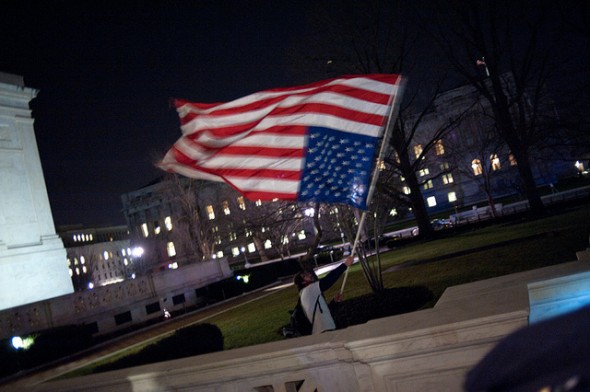
Distrust in the (Actual) United States Government
We don’t have to look hard to find quantitative evidence of this trend. Multiple polls reveal the same trend: a huge spike in distrust of government at the national level since 2001.
Here’s a Pew Research Center poll from April 2010 (the blue line indicates the percent of Americans who say they can “trust the federal government almost always or most of the time”):
Here’s a Gallup poll from September 2011:
And, in case you weren’t convinced there’s a real trend at play, here’s a New York Times/CBS News poll from October 2011:
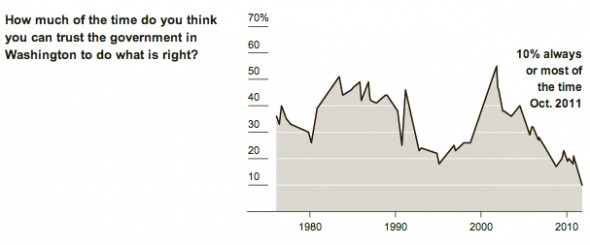 (As you can see from these graphs, there have been similar troughs in public confidence in Washington in the past. It’s not like this current age of discontent is unprecedented, but without an army of interns to do data entry and number crunching, I had to constrain the analysis somehow.)
(As you can see from these graphs, there have been similar troughs in public confidence in Washington in the past. It’s not like this current age of discontent is unprecedented, but without an army of interns to do data entry and number crunching, I had to constrain the analysis somehow.)
So with these polls, we’ve established the degree to which distrust in our government has trended upward since 2001. The easy part is done. Now how do we measure this in movies?
Distrust in the (Cinematic) United States Government
To measure this trend in movies, I took the top ten movies at the US box office for each year from 2001 to 2012. I then narrowed down on the movies to just those where the US government plays a substantial role in the plot. I defined “US government” as elected officials, any branch of the armed forces, agencies like the FBI or the CIA, or fictional government entities (like the National Super Agency from The Incredibles).
Now comes the tricky part. I then categorized each of these movies based on the overall portrayal of the US government, keeping in mind that “the US government” is not a single monolithic entity, but a collection of individuals and agencies:
- Negative. A US government official, agency, or the entire government itself is a clearly defined antagonist, or the actions of officials and agencies work to the detriment of the protagonist. Example: in the various Jason Bourne movies, the CIA is out to get our hero, Jason Bourne.
- Neutral. The US government neither helps nor hurts a protagonist, or its positive and negative actions balance each other out. Example: in the National Treasure movies, the secrets of the US government are neither good nor bad on their own and are mostly just motivators for private individuals to reach their goals.
- Positive. A US government official, agency, or the entire government itself is a clearly defined protagonist, or the actions of officials and agencies provide material assistance to a protagonist. Example: in Rush Hour 2, a US Secret Service agent helps Lee and Carter crack the case.
Admittedly, this was a highly subjective exercise. I’ll explain some of the edge cases in a moment, but for now, let’s see if this exercise yields any trends in the depiction of the US government in movies over the last twelve years:
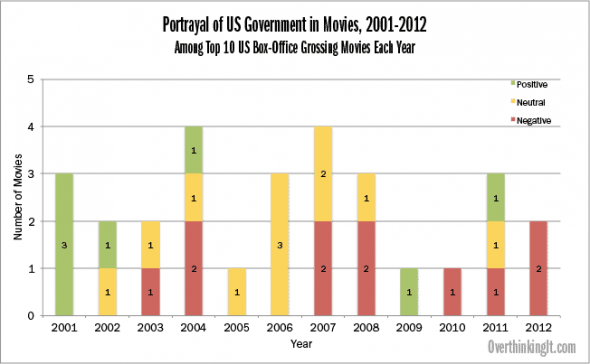
Updated July 18 to remove one “Negative” movie from 2010
(Note: of the 120 top ten grossing movies from 2001-2012, only 29 had plots that involved the US government to a significant degree.)
Is there an upward trend in negativity? When looking at this year-by-year, it’s a little tough to say, since in any given year there may be only 2 or 3 movies. So let’s group the data into three-year chunks and see what happens:
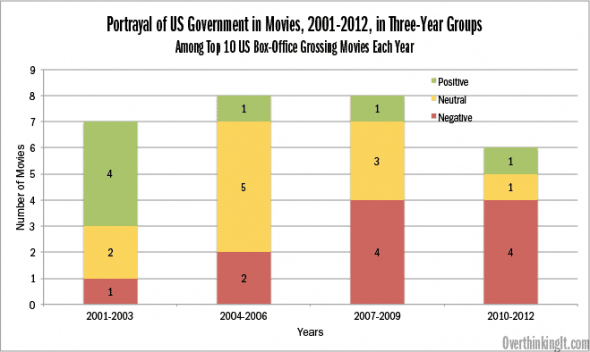
Updated July 18 to remove one “Negative” movie from 2010
Well, look at those bulging red bars of cinematic distain for the federal government grow over time.
As a reminder, here’s one of those graphs that shows (actual) declining trust in the (actual) federal government over the same period:

Now, before we declare victory and wave this around as incontrovertible proof of how public sentiment has influenced moviemaking over the past twelve years, we need to talk about the caveats:
- Grouping. I’m no statistician, but I’m pretty sure that what I just did above was more or less a neat trick to get the limited amount of data to fit the hypothesis better than it would ungrouped.
- Sample Size. I grabbed the top ten movies based on US box office for each year, thinking that they would be representative for the movies of their time. But since only a fraction of these movies had plots that involved the US government, that made the sample size smaller than I’d like it to be.
- Edge cases. Movies like Iron Man 2 are hard to put into one of my three categories, given that there are so many faces of the government on display: the sniveling senator who tries to take Tony’s armor, the military industrial complex that fuels Justin Hammer, and Colonel Rhodes who’s both Tony’s friend and an Air Force pilot. In the end I classified the portrayal of the US government as “negative” in this movie, but there’s a strong case to be made for “neutral” as well.
- Metaphors for the US Government. In Despicable Me 2, the Anti-Villain League does a half-assed job of neutralizing the threat, leaving the outsider Gru to finish the job. Could this be a metaphor for the US government? Maybe, but maybe not. A movie like Star Trek Into Darkness is probably using its fictional government as a way to comment on our actual government, but Despicable Me 2, probably not. I elected to avoid these ambiguous cases, but someone else with more time and/or an army of research interns would be more than welcome to try otherwise.
OK, so now that we’ve gotten these caveats out there, can we declare victory? Not yet. The movie data is in line with the trend that we’ve anecdotally identified, but it doesn’t prove its existence in the same way that the polling data proves the existence of the trend of growing distrust of the US government. A larger data set of movies would help get us draw these conclusions with greater confidence, certainly.
But absent that, I’m happy with what we have here, which is a quantitative starting place to further explore the complicated relationship between our politics and our entertainment.
So what do you think? Is art imitating life? In two years, will our multiplexes be full of Eric Snowden-inspired tales of government surveillance and the brave whistleblowers who would dare reveal them? Or is something else at play here? Sound off in the comments, you rebel, you!
(Oh, and if you’re a real nerd like me, check out the data set, and feel free to add onto it in your own copy. Just report back here with your findings.)
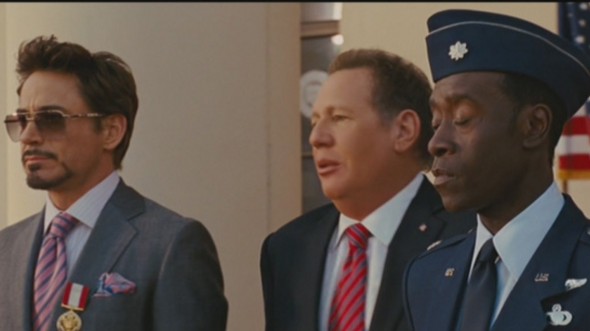
[Note: graphs updated on July 18, 2013 to correct a data entry error. One “Negative” movie was removed from the 2010 count.]
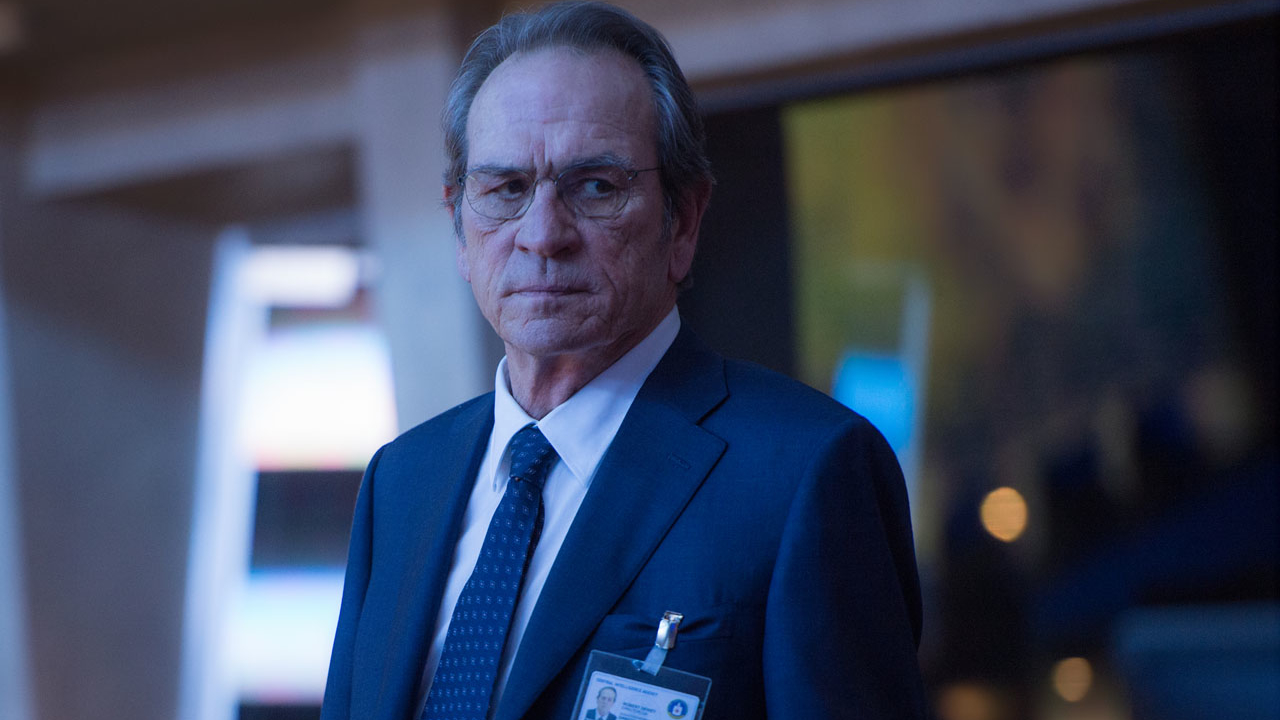
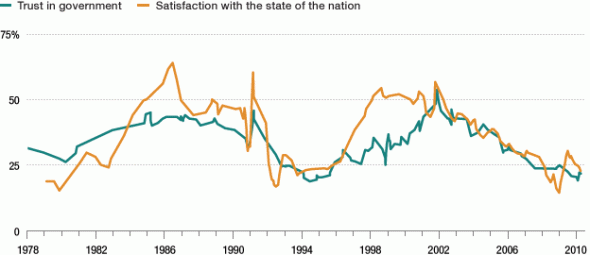
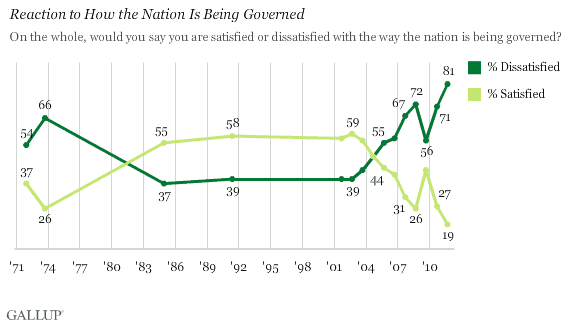
Neat article, but I wouldn’t say the government’s portrayal is negative in Pacific Rim. Outside of one scene where the government declines to continue pouring $Texas into a program that isn’t working, the entire film celebrates what thousands of people can do if they work together in an organized fashion under a central leader (Idris Elba). Indeed, the opening of the film makes clear that the governments of the world were able to put their differences aside in order to confront a common enemy. Far from most of the movies in recent years, Pacific Rim is much more of a throwback to the Depression-era notion that we’re all in this together and that governments and individuals can work together with pride to accomplish marvels. Even counting the giant monsters, it’s the film’s most unrealistic element, and a welcome one given the trend of cynicism, lone wolf-ism, and overall mistrust that you’ve pointed out here.
Yep. I thought it was like the UN running the Jaeger program? They did have an American guy as the voice of the “we’re shutting it down” decision, but the wall program was clearly an international decision since Australia was doing it too.
I think this depends on if you consider Idris Elba’s Jaeger operation a representative of “government” or not. I think it’s ambiguous in the movie from a technical perspective, but from a thematic perspective, it’s clear that this scrappy outfit represents something very different than the established government.
And yes, absolutely, the movie celebrates the communitarian spirit, and that communitarian spirit is referenced at the beginning of the movie as existing among nations as well, but for the important part of the story, we see a story of the communitarian spirit striving in spite of, not because of, government.
I’d be interested to see how this chart would look between 1990 and 2000. I would expect negativity to be similar to where it sits now. I think you see a bump around 2001-2002 in positive portrayals as a result of 9-11.
While I agree with your theory, I find it interesting that 2001 had the post positive-government movies, and no negative or neutral movies. 9/11 happened after the summer blockbuster season, and even if we assume the studios brought out their most patriotic movies right after 9/11, it still takes months or years to get a movie made from script to distribution, so I would have expected the upswing in positive portrayals to show up in 2002 and 2003. Instead, that’s right when the positive-government movies start to disappear.
While you’re right, I think that your focus is too narrow. The premise is more about authority than “the government” so you can include movies like Jack Reacher and Die Hard 5. Neither are explicitly about the US gov’t but it the same old song. An independent has to bail out or do the right thing because the authorities are too incompetent or corrupt to protect the citizenry.
You can throw in GI Joe for good measure. Actually, it’s a broad field and you may be amazed how pervasive that plotline is.
Interesting premise. I wonder what this would look like if you examined documentaries that in theory reflect “real life.”
There seems to be a coding error for 2010–you categorize Harry Potter and the Deathly Hallows 2 as not involving the US government (quite rightly) but then also categorize it as portraying the US government negatively.
You then list 2010 as having two negative movies when it only has one.
This affects your three year groupings as well, since 2010-2012 ties 2007-2009 on negative portrayals when corrected.
Sorry, it was Harry Potter Deathly Hallows 1, not 2 in 2010.
Thanks for point this out…too bad this wasn’t caught before this gets linked from Andrew Sullivan’s blog. :-/ Updating the charts now.
I think you need to more thoroughly explain your criteria for determining whether a movie’s presentation of government was “positive” or “negative.” When I look at the dataset, I find myself frequently disagreeing with the judgements you’ve made. How is MI Ghost Protocol “anti-government”? Do we end the movie with the feeling that IMF ought to be shut down?
If I recall the plot of MI Ghost Protocol correctly, IMF’s masters in Washington are too quick to blame IMF for the attack in Russia and cut them loose. The team then “goes rogue” and operates without the support of the feds for the rest of the movie. It’s not that IMF, or even their masters in Washington, are portrayed as outright villains. It’s just that the central decision making organization screwed up at the beginning and offer no support to our heroes throughout the movie. But I may not be remembering all of the details.
As for other movies that I haven’t seen, I relied on Wikipedia and IMDB plot synopses, which may not have fully described the role of the feds in those movies.
But at the end of the day, as I acknowledge above, the categorization exercise is highly subjective and open for debate.
Well, my impression was that the main characters aren’t so much “rogue” as in “ghost protocol,” which is never precisely defined, but has a bit more of an official ring to it, like it’s something that shadowy intelligence-state elites put in place precisely in order to deal with setup jobs like the Russia attack.
Also, pretty hard to imagine an Ethan Hunt character existing in the first place, without a huge government bureaucracy to train him and provide him with intel and resources, isn’t it?
I suspect that with a lot of these movies, they’re written so as to be rather ambiguous in their attitude towards government, central bureaucracy, etc. That way liberals and libertarians will both buy tickets!
At any rate, I remember a lot of paranoia films from the early 00s, though how they grossed I am not sure. Bourne Identity, Green Zone, Babel, Syriana. Most seasons of “24” had a “traitor in the top level of government” angle (though this is not the same thing as having an ANTI-government storyline). And just last year we had Argo and Zero Dark Thirty, which I think might be the most pro-CIA movies ever made. So, I feel like a trendline could as easily be drawn in the opposite direction.
I would argue Casino Royale is “positive” as opposed to “neutral”. Bond relies on the CIA’s money to get back into the poker tourney and bust Le Chiffre.
Also, I don’t remember an anti-US government tone in either Iron Man movie. Isn’t Tony Stark’s best friend in both movies the air force lieutenant guy? Don’t we feel pretty good about this character and all the qualities he represents? And isn’t the villain in BOTH movies a private-sector industrial mogul of some kind?
I’m not familiar with Harry Potter. Does Deathly Hollows really have some kind of US government angle?
Reading the wiki plot summary of Deathly Hallows and not grasping what it has to do with the US government. Explain?
Yeah, that was a data entry error on my part. It’s fixed now, along with the graphs.
Wow, Mark — this piece was linked to by Andrew Sullivan!:
http://dish.andrewsullivan.com/2013/07/18/chart-17/
Congrats!
I would adjust a little:
– Men In Black 2: The protagonists work in a US Government Agency, and save the world (will do again for the third time in 2013!). A Y and a Positive!
– Terminator 3: Negative! Government officers wanting to show off act with recklessness, a bad decision that leads to the end of the world!
– The Dark Knight: Yes and negative! The government’s institutions are rotting from the inside! And that gets the hero’s loved one killed.
Well… even if you don’t agree with my positives and negatives… I would add 2 movies to your sample! Care to try updating again? lol
An afterthought: if you make the changes above and groups the columns bi-annually, you will see a big red bar in 2007-2008: years of recession, joblessness and bank rescues! Maybe it’s all about the economy! (Although I had isolating a lonely factor!)
*hate isolating!